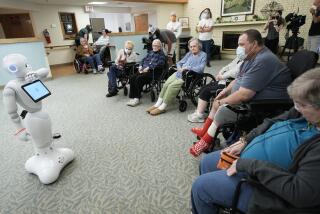Medicare May Set Standards : Panel Is Told of Problems With Home Care Services
- Share via
WASHINGTON — Pearl Tolbert, a 70-year-old paraplegic, has a tracheostomy, a surgical opening in her throat that must be covered when she bathes.
She nearly drowned when a home attendant put her in the shower without first bandaging her throat, she told the Senate Aging Committee on Monday. Another home attendant used her credit cards. “I had attendants who stole my clothes and stole my pots and pans,” said the Minneapolis resident, who testified from a wheelchair.
Tolbert was the first of a number of witnesses who told the committee about the difficulties of getting good care at home for those who are not sick enough to be in a hospital but are unable to manage alone.
‘Does as It Pleases’
Home care “is a multibillion-dollar, virtually unregulated industry that does pretty much as it pleases,” said Sen. John Melcher (D-Mont.), the committee chairman. “We trust to these people our loved ones--both young and old--who only want to recover in the friendly confines of their own homes.”
“In many cases, home care experts provide excellent and caring attention,” said Melcher, “but, far too often, Americans are suffering--and in some cases dying--because of poor or fraudulent home care.”
The committee was considering whether to support legislation imposing strict standards on home care agencies that receive reimbursements from the federal Medicare program.
The demand for such attendants has been growing rapidly as hospitals send elderly patients home sooner. Under a federal policy on hospitalization coverage that sets the amount of reimbursement allowed for each illness, a hospital loses money if a Medicare patient exceeds the specified maximum stay for his or her ailment.
Last year, Medicare payments helped to cover home care costs for 2.5 million people, and this benefit has become the fastest-growing part of the Medicare program.
At the hearing, officials pointed out that Medicare has no formal standards for the hiring and training of such home aides.
States may have standards, but place a low priority on enforcing them, said Don Nicholson, assistant inspector general of the Department of Health and Human Services, which runs Medicare.
He said that the quality of service varies considerably, that some agencies have well-trained personnel who receive good pay and benefits while others offer low pay and have high rates of turnover.
Sharon Glover, Tolbert’s daughter, said that an attendant who was fired for abusing her mother was able to find a job with another agency the same day.
“There isn’t very much you can do,” she said. “The demand is so great.
“The caliber of people is getting worse,” said Glover, who spends 30 hours a week visiting and caring for her mother. She said she makes surprise visits to make sure that the attendants are treating her mother properly.
Can’t Read Label
Tolbert’s current attendant, said Glover, cannot administer medicines because she cannot read a prescription label.
Another witness, Nilda Grudza of Pennsylvania, said that her mother, who has Alzheimer’s disease, was hospitalized for a week for severe dehydration because a home aide did not give her enough to drink.
Melcher said that he hopes legislative action can improve conditions for those who need care at home. “I intend to find a way to rein in the industry and ensure quality home care to the millions of Americans who need it,” he said.
More to Read
Inside the business of entertainment
The Wide Shot brings you news, analysis and insights on everything from streaming wars to production — and what it all means for the future.
You may occasionally receive promotional content from the Los Angeles Times.









